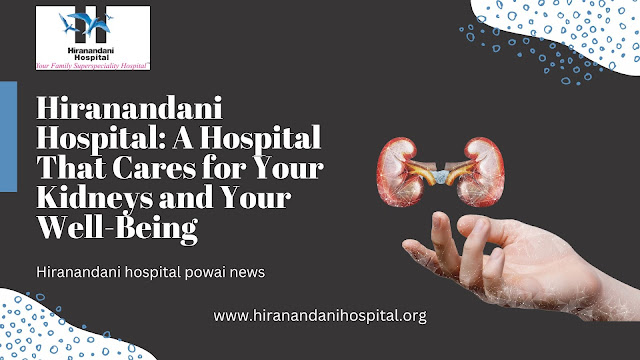Managing Diet and Nutrition for Kidney Health
Maintaining good kidney health is essential for overall
well-being. The kidneys play a crucial role in filtering waste and toxins from
the blood, balancing electrolytes, and regulating blood pressure. A
well-balanced diet and proper nutrition are key factors in preventing kidney
diseases and managing existing conditions. In this blog, we will explore the
essential aspects of managing diet and nutrition to promote kidney health by Dr.
Sujit Chatterjee CEO Hiranandani Hospital.
Stay Hydrated
Adequate hydration is vital for kidney function. Water helps
flush out toxins and waste products from the kidneys, reducing the risk of
kidney stones and other kidney-related issues. Aim to drink at least 8 cups (64
ounces) of water daily, and adjust your intake based on your activity level and
climate.
Control Sodium Intake
High sodium levels can elevate blood pressure and put extra
strain on the kidneys. Reducing sodium intake is crucial for kidney health,
especially for individuals with hypertension or kidney problems. Avoid
processed and packaged foods, as they often contain excessive sodium. Instead,
opt for fresh, whole foods and use herbs and spices to add flavour to your
dishes.
Limit Phosphorus and Potassium
People with kidney disease should monitor their phosphorus
and potassium intake. High levels of these minerals can disrupt the body's
balance and cause further damage to the kidneys. Foods rich in phosphorus
include dairy products, nuts, and seeds, while potassium is abundant in
bananas, oranges, tomatoes, and potatoes. Moderation is key; work with a dietitian
to create a personalized meal plan that suits your needs.
Choose Low-Protein Foods
Protein is an essential nutrient, but excessive intake can
strain the kidneys. If you have kidney problems, opt for high-quality protein
sources with lower phosphorus content, such as fish, poultry, and eggs.
Plant-based proteins like beans, lentils, and tofu are also good alternatives.
Consult with a healthcare professional of Hiranandani hospital
Powai news to determine the appropriate protein intake for your
condition.
Monitor Fluid Intake
For individuals with advanced kidney disease, fluid intake
may need to be restricted to prevent fluid retention and swelling. It's
essential to track both the liquid you drink and the liquid contained in foods
like soups, fruits, and vegetables. Your healthcare team can help you determine
the right amount of fluid for your specific needs.
Manage Blood Sugar and Blood Pressure
Diabetes and high blood pressure are leading causes of
kidney disease. If you have diabetes or hypertension, managing your blood sugar
and blood pressure levels is crucial in maintaining kidney health. Follow your
doctor's recommendations regarding medications, lifestyle changes, and diet
modifications.
Avoid Over-the-Counter Medications and Supplements
Some over-the-counter medications, herbal supplements, and
vitamins can be harmful to the kidneys. Nonsteroidal anti-inflammatory drugs
(NSAIDs), such as ibuprofen and aspirin, should be used cautiously, as
prolonged use can lead to kidney damage. Always consult your healthcare
provider before starting any new medications or supplements.
Weight Management
Maintaining a healthy weight is essential for kidney health.
Obesity is linked to an increased risk of kidney disease and other health
problems. Adopt a balanced diet and engage in regular physical activity to
achieve and maintain a healthy weight.
Conclusion
Caring for your kidneys through a well-balanced diet and
proper nutrition is a proactive approach to prevent kidney disease and manage
existing conditions. Make small, sustainable changes to your eating habits,
stay hydrated, and monitor your nutrient intake. Consult with healthcare
professionals such as Sujit Chatterjee
Hiranandani and registered dietitians to create a personalized plan
that caters to your specific needs. By taking these steps, you can promote
better kidney health and enhance your overall quality of life. Remember, prevention
is always better than cure.



Comments
Post a Comment